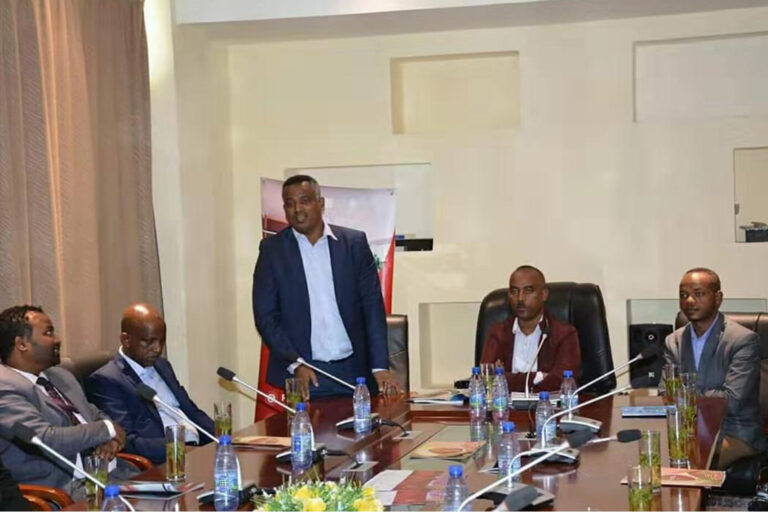A draft real estate development and marketing proclamation will ban foreign investors from selling unfinished property.
The draft proclamation that is expected to be tabled to the parliament this year has also put assurances developers give for buyers.
The country does not have a real estate proclamation and at the same time the sector has been vulnerable for cheating and several abuses including significant delay and price hike than the original deal.
Due to lack of formal regulation and preconditions the sector is stated as a risky business deal between developers and clients, while in the past few years some actors who preferred to undertake the construction before selling, comparatively transfer the property in a better time frame and has changed the attitude on the sector.
According to the draft proclamation that Capital secured, local developers are allowed to sell houses with zero construction stage. However it has indicated that the non-Ethiopian investors should finalize the project before sells.
The draft proclamation article 8 sub article 2 indicated that the developer should have land deed and construction permit, before starting a registration of clients and collects down payment.
The proclamation article 6 sub article 3 stated that foreign real estate developer will only be registered if it allocates more than USD 20 million in capital and could construct 10,000 houses and of the stated houses 40 percent will be allocated to low income people.
Moreover the foreign real estate developer will get a license if it would cover the foreign currency required for the import of products under the construction period and would not transfer out 60 percent of its profit for 10 years.
The draft proclamation has also given a third option for foreign developers to be registered in the sector. It stated that the developer will be registered if it substitutes import materials.
According to article 6 sub article 2 of the proclamation, even though the developer is not Ethiopian but would not transfer its profit from the development to another country will be considered as Ethiopian developer.
Developers that would construct more than 50 houses should be registered under the real estate proclamation.
The draft proclamation also indicated that the land allocation for real estate development in cities shall be managed under the lease law. It has also added that plots shall be given on allotment if the developer constructs 10,000 houses in Addis Ababa, develop more than 2,000 houses around a town that have industrial park, or other cities with demands more than 1,000 houses.
It added that special tender will be applicable if the developer develops from 1,000 to 10,000 houses in Addis Ababa, from 500 to 2,000 in industry park areas, and 50 to 1,000 houses in other towns.
The proclamation has also forced developers to give assurance for their developments.
Article nine of the proclamation stated that the developer should give assurance and get permit from relevant government office to sell houses.
On the draft proclamation only local investors or others that are considered as local investors are allowed to sell houses before the.
According to article 9 sub articles 1 local developer should get permission from relevant government body to start sell on unconstructed estates. The relevant body will hold the land deed and other documents until the houses are transferred for clients, according to sub article 2 of the same article.
Sub article 3 has also added that the relevant government body will follow the management of money that is collected from home buyers by the real estate developer, while further regulation will be ratified regarding the release of the money that is deposited on the bank account by buyers.
The real estate development proclamation has been under discussion some few years ago but the ratification process did not happen so far.
According to the information that Capital obtained from Ministry of Urban Development and Construction the draft proclamation is expected to be approved by the parliament this year.
New bill in process for real estate developers
OWNING NOTHING
The hypocrisy/phoniness of the modern world system has no bound. The global status quo has a serious problem conveying actual facts and information to the global public at large, especially when these facts/truths are not to its liking. On the other hand, when we have brave souls who dare speak/talk the truth and communicate unadulterated information to the global sheeple (human mass), they end up being persecuted, in one form or another. Dubious allegations and indictments are concocted to undermine, ostracize and convict these individuals. Amongst the well-known truth telling individuals in the rich countries, we can mention, amongst many others, Julian Assange and Chelsea Manning. Since such kosher elements in our part of the world (poor nations) are too many to mention, we leave it to the almighty to have mercy on them, both here and in the heavenly world hereafter! See the articles next column, on pages 33,36 & 38 .
The prevailing global lies are not only about current events or some insignificant temporal matters. These lies also involve foundational principles that underlie the core of the world system in which we live. For instance, the global economic system is based on the shallow and stupid assumption of infinite growth at any cost! This assumption is not only fallacious, but is actually the very germ or seed from which all destructive activities (both to humans and nature) sprout. Moreover, the existing financial system that is borne of fractional reserve banking (FRB) that is running the world system is a bona fide criminal undertaking, sanctioned by the highly compromised capital-favoring inter-states system. In the beginning, the state used to be the protector of collective social existence. It was the prerogative of the state to protect humanity from activities that were deemed damaging and dangerous to collective social existence.When certain unholy inclinations or organizations (within a society) seem to creep up, the state, which was then called the ‘anti-market’, was obligated to take swift action to thwart off the various ascending harmful tendencies. Unfortunately, the modern state today is fully under the thumb of transnational capital, hence is not capable of protecting, neither the citizens nor the larger natural world, from the prevailing greed-propelled modern world system. It is time to take charge; the modern nation state is not and will not be willing to take decisive measures against the prevailing destructive system, no matter what the damage! See Smith’s article on page 36.
Here is another major distortion of fact/truth that dominates the existing world order. This concerns the world of finance. When banks lend individuals money, the banks usually demand some kind of collateral from borrowers. Usually such an arrangement doesn’t apply to the big players of the system, like banks, hedge funds, powerful states, etc. etc. If the borrower gets into trouble, the collateral ends up being possessed by the banks/lenders. In other words, when the going is good, the banks get their interest payments. When the going is bad, the banks foreclose on the collaterals. Lenders/banks are covered both ways. The situation is like ‘heads you lose’ and ‘tails I win’! Therefore and frankly speaking, anyone with loans, mortgage or otherwise, cannot in all honesty claim to own the underlying real assets that are supposedly under their names. Even the notion of equity, which is intended to signify ownership (at least a portion of it), doesn’t really hold water when conditions start to significantly deteriorate. Even if a house that is owned clean and clear (of all loans), the owner of the asset is still potentially liable to government taxes, property or otherwise. If the owner cannot pay the ever-increasing taxes, dues or fees, etc., then the state has the legal rights (formal) to confiscate the asset/property in question! Given all these visible and hidden obligations, can one really say that one owns this or that asset?
What the above scenario illustrates is this; at the end of the day, it is the banks that own all and sundry! The rest of us are mere dreamers, hoping that one day everything will turns out right, with the hope that one day we make good and increase our meager wealth to reach the richness of the .01%! Now this is not the end of it. Just like the local/international banks/lenders (some and tchnically) own anything & everything in a given economy, there is a big bank that owns anything & everything in the world. This is the one bank Nielson talks about. This is the real mega bank that owns around 40% of the world GDP! Unlike us, this bank doesn’t go around boasting that it owns 40% of the world. In fact, it goes out of its way to hide what it actually and truly owns, at least within the framework of global laws. It is only us, small time capitalist cravers, who go on boasting about our tiny wealth, which of course in nothing more than a disguised gratuity of the ‘One Bank’! So what is to be done? For a start, the global sheeple has to start reacting against the obvious destructive measures that are continuously pushed by transnational capital. Secondly, the global mass has to come to terms with its own reality and must stop worshipping the useless make-believe world of the cunny ‘deep state’, as exemplified by the likes of Hollywood, et al. The very belief/recognition that humanity is inherently capable of devising a more saner and equitable world system to benefit all, including the natural world, must remain, per force, as the real specter of the 21st century!
‘There have been three great inventions since the beginning of time: fire, the wheel, and Central Banking.’ Will Rogers. Mimicking Kissinger’s dictum on oil, here is a more comprehensive maxim. “Who controls the food supply controls the people; who controls the energy can control whole continents; who controls money can control the world.” Good Day!
Chinese hotel franchising giant to open a five star hotel in Ethiopia
By Ruth Brook
Adwa will see the introduction of a new hotel franchise setting foot in Africa with Ethiopia as its first destination. Chinese company, Sunmei International, is opening a five star hotel – Rizti Hotel – in Adwa, Tigray region.
The expansion into the African market is not a new venture for the company, Sunmei launched into the continent in 2018 with hopes of opening two major hotel brands – IVY and Rizti – in Africa, with Ethiopia as the first location for both; these brands were created specifically for the African market.
Sunmei International is a joint venture subsidiary of Chinese company, Sunmei Group, with over 10 years in the hospitality business and 5000 hotels in Europe and Asia, the majority of which are in China. This is Sunmei Group’s first step in reaching their goal of building Africa’s largest hotel chain.
“Adwa is the first of many locations in Ethiopia that Sunmei hopes to franchise in. The company is currently looking into opening a Rizti franchise in Mekelle, Hawassa and Bahir Dar,” said Eden Tadesse, Sunmei Brand and Marketing Manager.
Plans for the hotel are underway, with Sunmei planning to have Rizti sit on 7,000 square meters in Adwa with 203 rooms.
“Our company handles everything related to hotels, design, construction, renovation, decoration, and consultancy and marketing materials, all from China,” said Jack Sun, Sunmei Business Development Manager.
A subsidiary of the Sunmei Hotel Group, Rizti Hotel is a 5-6 star hotel; it affiliates art and culture into the travelling experience and aims to provide a sanctuary for global travelers.
The Rizti hotel in Adwa is set to open in a short period of time, Eden announced.
The first IVY hotel is also currently under construction, with plans of opening in the next 6 months in Area 22, Addis Ababa. IVY Hotels hold a 3-4 star rating and are designed to be an economic chain hotel with a target market of “business economy”.
The company closely monitors their hotels to make sure they uphold the set standard.
“If they meet our standard we just do light renovation and decoration, there will be franchise fees they have to pay,” Eden explained.
The franchise company is ranked 16th in the world and 5th in Asia. Sunmei Group is looking to expand both IVY and Rizti hotels in Nigeria, Tanzania, Uganda and Kenya in the near future.
Going full electric
Tesla Model S vehicles up for sale by local importer
Ethiopian importers and assemblers are moving forward in the vehicle industry. Kahinos Car Importer, locally owned import and Trade Company starts to import the Tesla Model S vehicles that are fully electric, to the local market for the first time.
Tesla Model S is known as a phenomenal vehicle and one of the best vehicles in the luxury hybrid and electric models. It is an all-electric five-door lift back sedan with Dual Motor All-Wheel Drive produced by Tesla Inc., and introduced on June 22, 2012.
The model is built with best in class storage, seating for up to five adults and an expansive 17-inch touch screen. Advanced noise engineering creates sound dynamics comparable to a recording studio, while the standard Glass Roof provides a spacious interior experience for every passenger.
Unlike gasoline cars, Tesla cars require no traditional oil changes, fuel filters, spark plug replacements or emission checks. Tesla cars have a powerful battery, which is charged by electricity.
“The battery had enough power to travel 385 miles /600 km/ once the car is charged fully” said Yahunualem Tadesse owner and General Manager of Kahinos. “This model is imported from Dubai and we have plans to import other models of Tesla to provide for the local market,” said Yahunualem adding that “although foreign currency may be our biggest challenge.” 
The Tesla Model S vehicles built after October 2016 have the option of an advanced driver assistance system that allows the car to operate without assistance from the driver, but the driver must supervise continuously and take control if there is an issue. This feature is called Autopilot.
The Tesla Model S was the top-selling plug-in electric car worldwide in 2015 and 2016, and by the end of 2018 continued to rank as the second most-sold electric car in history after the Nissan Leaf. The December 2017 Consumer Reports owner satisfaction survey had the Tesla Model S at the top. In 2019, the US magazine Motor Trend named the 2013 Tesla Model S the ultimate car of the year over the magazine’s 70-year history.
A couple of weeks ago marathon motors has also announced to start assembling new models of electric cars in the coming three months.
According to Melkamu Assefa Managing Director of Marathon Motors the newly upcoming car is going to be able to be charged at a house hold level with 220 volt and the car will have the capacity to travel more than 300 km by charging six hours.
In Ethiopia, a country with the lowest numbers of cars in the world at 1.1 million, of which half are located in the capital, demand for cars is high. Out of the total number of cars, 219,699 vehicles are small automobiles.
Certainly it is not common to see electric cars at road of Addis Ababa not even newly assembled cars. Recently the government is moving to revise the Excise tax on luxury and harmful products protect the environment which includes used cars. The Revised excise tax rate draft imposes up to 500% excise tax on vehicles based on their service year
Excise tax on new imported automobiles and semi-electric cars is reduced from 35 to 30 and 35 to 20 percent, respectively, and on full electric cars decreased to 10 percent which is 20 % currently.
Tesla cars, therefore, are relatively expensive to buy. The flagship Model S sedan has a base price of $71,000 not including a $10,000 extended battery or other upgrades and options. However both Melkamu and Yahunualem shares the idea that even if the electric cars price is higher than the cars that use gasoline, once they are purchased there is no need for maintenance and fuel.
“The cars don’t need oil and gas and can travel without any cost for ten years,” said both Yahunualem and Melkamu “It only needs periodic inspection.”






